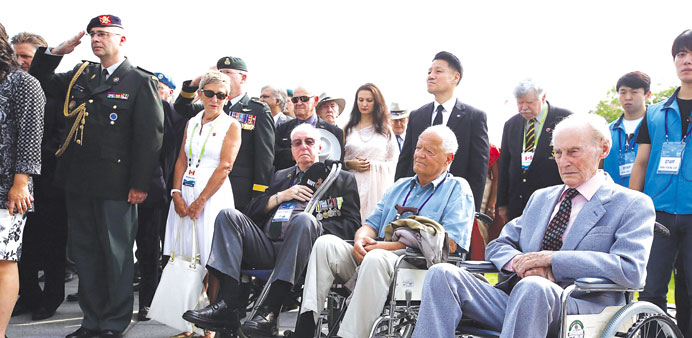The veterans of the Korean War and 21 government delegations from UN allied nations, salute during their visit to Seoul’s National Cemetery yesterday. The war veterans and government delegations are in Seoul to attend the commemoration for the 60th anniversary of the Korean War.
By Dirk Godder /Seoul
Major-General Urs Gerber of the Swiss Army says the need for his troops’ presence on the border between the two Koreas will not disappear any time soon.
“We will stay here as long as required,” he says.
Swiss soldiers and their Swedish counterparts have been stationed between North and South Korea for six decades.
Their task as members of the Neutral Nations Supervisory Commission is to ensure the observance of the armistice that halted the three-year Korean War 60 years ago today.
As part of their mission, the two European contingents take part in a symbolic ritual every Tuesday in the so-called ceasefire village of Panmunjom.
Five members each of the Swiss and Swedish forces meet for routine discussions. Afterward, a representative puts the minutes of the meeting, addressed to the Korean People’s Army, into a letter box concealed behind a door.
This mail remains uncollected. The bizarre procedure is maintained as a gesture to communicate with the North.
“The post has not been collected since 1995,” Gerber told a group of German visitors to the deserted village. “The North Koreans regard us as a ghost organisation.”
The international troops persist in the exercise to try to show the North Koreans that they take their monitoring duties seriously on the southern side of the border.
But it also demonstrates the unstable situation on the Korean peninsula is far from stable. The two Koreas remain technically at war, as no peace agreement has been signed.
More than 1mn troops from both sides face off across the 38th parallel, separated by a buffer zone just 4km wide.
South Korea has long accused the North of undermining the truce. The aim of the communist government in Pyongyang is to replace the document with a peace treaty with the US.
Pyongyang believes an agreement of that kind would render the US military presence in South Korea redundant.
But Washington and Seoul demand concrete steps from the North on dismantling its nuclear programme before there can be any progress towards a peace settlement.
More six decades ago, only large scale intervention by UN troops was able to stem an unexpected invasion by North Korean forces in June 1950.
Armistice talks dragged on for almost two years, and the continuing fragility of the agreement has been demonstrated by the many border incidents since.
In March, Pyongyang announced it was withdrawing from the agreement, although it was not the first time it had done so. The ongoing tension over the North Korean nuclear programme worsened after its third test in February.
Pyongyang has since sent signals that it wants to reduce tensions on the peninsula.
This year, South Korea is marking the anniversary of the signing for the first time with a national memorial ceremony.
The Ministry of Patriots and Veterans Affairs said the intention was to show gratitude and to confirm friendships. It may also be the last chance for some South Korean veterans of the conflict to participate in such a ceremony. The average age of some 200,000 veterans in the South is 82, according to Veterans Affairs chief Park Jong Wang.

